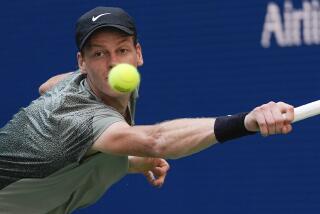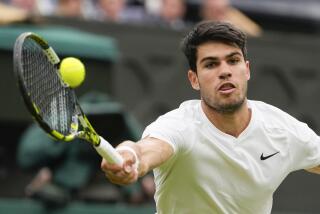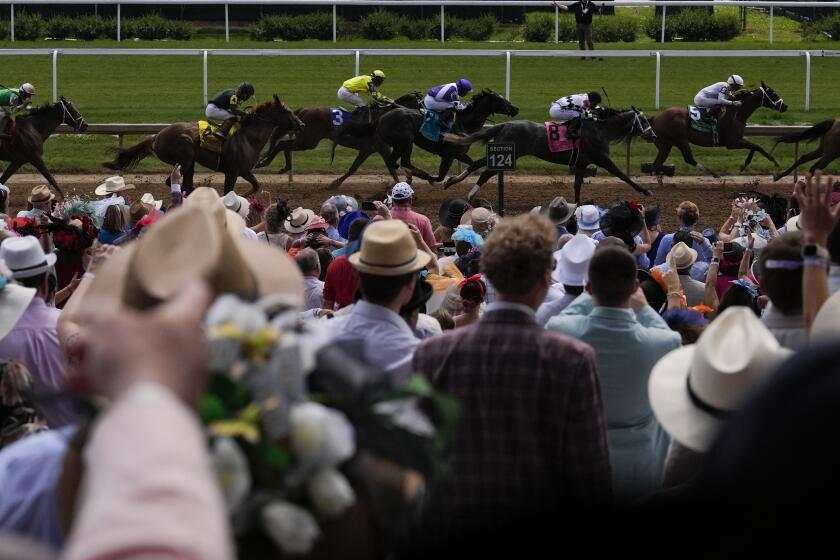TENNIS / WIMBLEDON CHAMPIONSHIPS : Rostagno in World of His Own: 3rd Round
- Share via
LONDON — One day after he beat John McEnroe, refused to bow to the Royal Box and knew so little about his next opponent that he called him “Jeremy who?” Derrick Rostagno came back to the All England Club and basically did it all again.
No, Rostagno didn’t have McEnroe around any more, but he did beat England’s best player, Jeremy Bates, in front of a Court 1 crowd cheering on their Wimbledon favorite.
And, of course, Derrick, you were rattled by the pro-Bates crowd, right?
(Long pause). “You know, I didn’t really notice, sorry to say,” he said.
Rostagno, marching to the beat of a different drummer, possibly the bongos he plays, advanced to the third round with a 6-1, 3-6, 6-4, 6-1 victory Wednesday over Bates, thereby brightening up an otherwise routine day.
Second-seeded West German Boris Becker strode past Aussie Wally Masur, 6-7 (7-5), 6-2, 6-3, 6-2, and said afterward he isn’t bothered that many are picking Ivan Lendl to win his first Wimbledon.
Why?
“I didn’t pick him,” Becker said.
Seventh-seeded Brad Gilbert beat South African qualifier Danie Visser, 5-7, 6-3, 6-2, 6-2, and joined another American, 21-year-old David Wheaton, in the second round.
Wheaton beat Paul Annacone, 6-4, 1-6, 6-4, 6-7 (7-3), 6-4, helped greatly by a controversial umpire’s ruling. Chair umpire George Grime overruled a call on Wheaton’s serve and gave him an ace, setting up match point.
Annacone was philosophical: “Anything can happen over here and anything usually does.”
That would seem to include Rostagno. The 24-year-old from Brentwood, son of Juan Rostagno--a former violinist with the Los Angeles Philharmonic--reached the third round for only the second time.
He dropped the second set to Bates and blamed a natural letdown from his first-round victory over McEnroe.
“I mean, it’s, you know, to come back right away the next day, I knew there would be a letdown,” Rostagno said. “I tried to get excited to play again, which I did.”
Although Juan and Helga Rostagno were not in the crowd, Rostagno said he felt his parents’ presence.
“They are here in spirit,” he said.
Actually, if there is anything Rostagno himself has, it is spirit. Juan Rostagno, a lawyer, said his son sometimes has too much of it.
“He causes me much anxiety,” Juan Rostagno said in a telephone interview.
The elder Rostagno said Derrick worries him with his varied off-court activities, such as diving from waterfalls, flying airplanes and riding motorcycles.
Last winter, he said his son rode a motorcycle from St. Augustine, Fla., to Toronto to play in a tournament.
“Certainly that was not pleasing me too much,” Juan Rostagno said. “I finally convinced him to sell his Harley-Davidson. I was very fearful for his life.
“He loves life too much.”
Rostagno’s parents came to the United States in 1960. Juan is Italian and was raised in Buenos Aires. He met Helga, who is German, while he was studying music in Paris. Derrick was born in Hollywood.
At 10, he quit soccer to concentrate on tennis at the Jack Kramer Tennis Club in Palos Verdes. Rostagno went on to play tennis at Stanford and studied economics but turned professional after his sophomore year.
On the tour, Rostagno has been ranked as low as No. 129, which he is now, and as high as No. 35. He has never won a tournament, possibly because he hasn’t devoted himself exclusively to tennis.
“I wonder sometimes if he put in the dedication to tennis, what he would do,” Juan Rostagno said. “But his other intents are good for him. They diffuse his passion. If he channeled all into tennis, he would probably explode.”
Rostagno plays five instruments and until recently, kept a van on both coasts to travel to tournaments. A recent article in World Tennis said Rostagno owns a Porsche and a 1978 Volkswagen bus covered with bumper stickers. One reads “Dead Head.” Another reads “No MBA, No Condo, No BMW.” Still another reads “Are you lost? Such is the human condition.”
It seems clear that Rostagno isn’t lost on grass. Sure, he can identify Bach’s “Toccata and Fugue in D Minor” when he hears it, but he also knows how to play some pretty fair grass-court tennis.
In the third round, he meets Goran Ivanisevic, a hard-hitting, left-handed Yugoslav who reached the quarterfinals of the French Open. As usual, Rostagno will appear on court in clothes he bought because he does not have a clothing contract. Neither does he have a shoe or racket contract. Rostagno doesn’t believe in them.
“I just focus on the match and think about playing,” Rostagno said. “And that’s the end of it.”
He even sounded as if he believed it. Maybe he did. After all, the van is back home.
More to Read
Go beyond the scoreboard
Get the latest on L.A.'s teams in the daily Sports Report newsletter.
You may occasionally receive promotional content from the Los Angeles Times.










